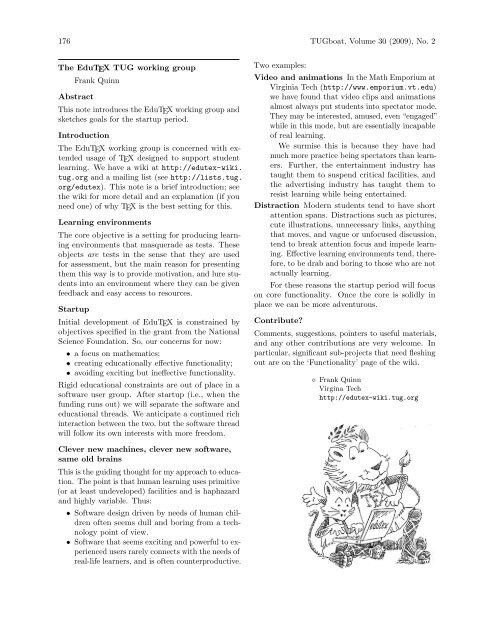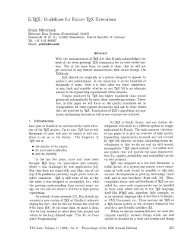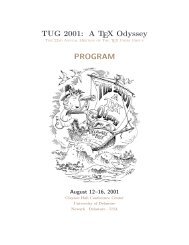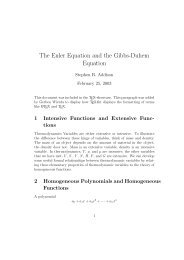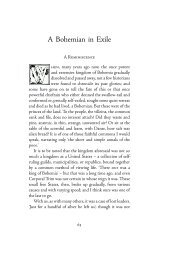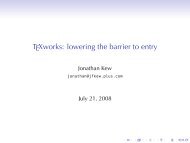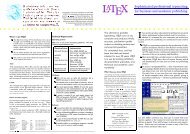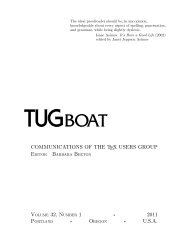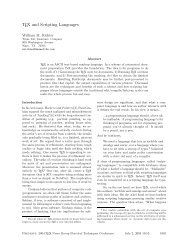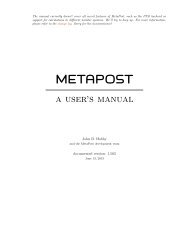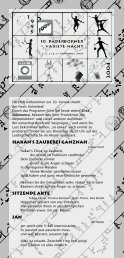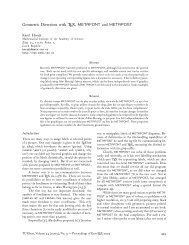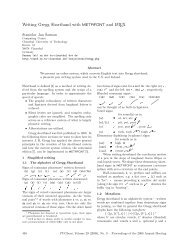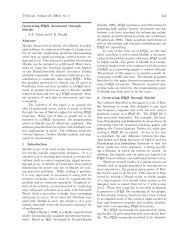The Communications of the TEX Users Group Volume 30 ... - TUG
The Communications of the TEX Users Group Volume 30 ... - TUG
The Communications of the TEX Users Group Volume 30 ... - TUG
You also want an ePaper? Increase the reach of your titles
YUMPU automatically turns print PDFs into web optimized ePapers that Google loves.
176 <strong>TUG</strong>boat, <strong>Volume</strong> <strong>30</strong> (2009), No. 2<br />
<strong>The</strong> Edu<strong>TEX</strong> <strong>TUG</strong> working group<br />
Frank Quinn<br />
Abstract<br />
This note introduces <strong>the</strong> Edu<strong>TEX</strong> working group and<br />
sketches goals for <strong>the</strong> startup period.<br />
Introduction<br />
<strong>The</strong> Edu<strong>TEX</strong> working group is concerned with extended<br />
usage <strong>of</strong> <strong>TEX</strong> designed to support student<br />
learning. We have a wiki at http://edutex-wiki.<br />
tug.org and a mailing list (see http://lists.tug.<br />
org/edutex). This note is a brief introduction; see<br />
<strong>the</strong> wiki for more detail and an explanation (if you<br />
need one) <strong>of</strong> why <strong>TEX</strong> is <strong>the</strong> best setting for this.<br />
Learning environments<br />
<strong>The</strong> core objective is a setting for producing learning<br />
environments that masquerade as tests. <strong>The</strong>se<br />
objects are tests in <strong>the</strong> sense that <strong>the</strong>y are used<br />
for assessment, but <strong>the</strong> main reason for presenting<br />
<strong>the</strong>m this way is to provide motivation, and lure students<br />
into an environment where <strong>the</strong>y can be given<br />
feedback and easy access to resources.<br />
Startup<br />
Initial development <strong>of</strong> Edu<strong>TEX</strong> is constrained by<br />
objectives specified in <strong>the</strong> grant from <strong>the</strong> National<br />
Science Foundation. So, our concerns for now:<br />
• a focus on ma<strong>the</strong>matics;<br />
• creating educationally effective functionality;<br />
• avoiding exciting but ineffective functionality.<br />
Rigid educational constraints are out <strong>of</strong> place in a<br />
s<strong>of</strong>tware user group. After startup (i.e., when <strong>the</strong><br />
funding runs out) we will separate <strong>the</strong> s<strong>of</strong>tware and<br />
educational threads. We anticipate a continued rich<br />
interaction between <strong>the</strong> two, but <strong>the</strong> s<strong>of</strong>tware thread<br />
will follow its own interests with more freedom.<br />
Clever new machines, clever new s<strong>of</strong>tware,<br />
same old brains<br />
This is <strong>the</strong> guiding thought for my approach to education.<br />
<strong>The</strong> point is that human learning uses primitive<br />
(or at least undeveloped) facilities and is haphazard<br />
and highly variable. Thus:<br />
• S<strong>of</strong>tware design driven by needs <strong>of</strong> human children<br />
<strong>of</strong>ten seems dull and boring from a technology<br />
point <strong>of</strong> view.<br />
• S<strong>of</strong>tware that seems exciting and powerful to experienced<br />
users rarely connects with <strong>the</strong> needs <strong>of</strong><br />
real-life learners, and is <strong>of</strong>ten counterproductive.<br />
Two examples:<br />
Video and animations In <strong>the</strong> Math Emporium at<br />
Virginia Tech (http://www.emporium.vt.edu)<br />
we have found that video clips and animations<br />
almost always put students into spectator mode.<br />
<strong>The</strong>y may be interested, amused, even “engaged”<br />
while in this mode, but are essentially incapable<br />
<strong>of</strong> real learning.<br />
We surmise this is because <strong>the</strong>y have had<br />
much more practice being spectators than learners.<br />
Fur<strong>the</strong>r, <strong>the</strong> entertainment industry has<br />
taught <strong>the</strong>m to suspend critical facilities, and<br />
<strong>the</strong> advertising industry has taught <strong>the</strong>m to<br />
resist learning while being entertained.<br />
Distraction Modern students tend to have short<br />
attention spans. Distractions such as pictures,<br />
cute illustrations, unnecessary links, anything<br />
that moves, and vague or unfocused discussion,<br />
tend to break attention focus and impede learning.<br />
Effective learning environments tend, <strong>the</strong>refore,<br />
to be drab and boring to those who are not<br />
actually learning.<br />
For <strong>the</strong>se reasons <strong>the</strong> startup period will focus<br />
on core functionality. Once <strong>the</strong> core is solidly in<br />
place we can be more adventurous.<br />
Contribute?<br />
Comments, suggestions, pointers to useful materials,<br />
and any o<strong>the</strong>r contributions are very welcome. In<br />
particular, significant sub-projects that need fleshing<br />
out are on <strong>the</strong> ‘Functionality’ page <strong>of</strong> <strong>the</strong> wiki.<br />
⋄ Frank Quinn<br />
Virgina Tech<br />
http://edutex-wiki.tug.org


